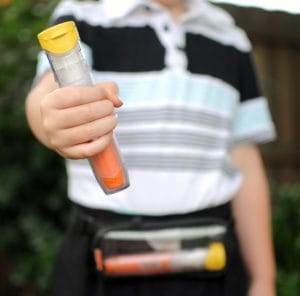
Updated Aug. 20, 2019: The demand for epinephrine auto-injectors is climbing swiftly, right alongside the growth in food allergies, which are now estimated to affect 32 million Americans. Yet with back-to-school season here – a heavy refill period – frustrations have grown as the supply shortage of Mylan NV’s EpiPen, EpiPen Jr and generic equivalents hit the 15-month mark.
Pharmacist Carter High, who manages Best Value Pharmacy in Rhome, Texas, is faced with telling food allergy families that they could wait six to nine months to fill a prescription for an EpiPen or equivalent generic auto-injector two-pack.
“I can understand having low availability, but having none of it?” questions High. “You can’t go without it when you’re having an anaphylactic reaction. You don’t have the luxury of waiting.” In December 2018, the pharmacist had several patients on waiting lists for the Mylan devices. Seven months later, he hasn’t seen much change.
Neither has Dared Price, owner of two pharmacies in Arkansas City and Winfield, Kansas. “It’s still hard to get shipments,” said Price. “You’re scrambling to find devices. Once, I called four or five different pharmacies plus checked my wholesaler and my secondary wholesaler – nobody had it.”
A Mylan spokesperson said the company is expediting shipments as soon as they’re available, yet many people are struggling to find the company’s devices. Allergic Living has heard recently from families in New York, Illinois, New Jersey and California, all of whom report difficulty locating either the branded or generic Mylan auto-injectors. Other news outlets are publishing similar reports.
Choice of Devices Grow
The much brighter note on epinephrine access in 2019, at least in the United States, is that there are now alternative devices available. The best-known are the compact Auvi-Q auto-injector (with voice instructions) and Amneal’s generic version of the Adrenaclick. Other options include Teva’s generic version of the EpiPen, while Sandoz launched the newest entrance to the marketplace, the pre-filled epinephrine syringe called Symjepi, in pharmacies as of July. (See below for the four products’ details and pricing.)
In early May 2018, the FDA first declared a national shortage of Mylan’s EpiPen, EpiPen Jr and the equivalent generic devices, citing “manufacturing delays” at the Pfizer Inc. facility in Missouri that produces the epinephrine devices. Amneal’s generic device, sold through CVS and other pharmacies, has faced intermittent shortages as well, since it is produced at the same Pfizer-owned Meridian Technologies facility.
Why the Long Delay
The big question is “why” the Meridian manufacturing delays have stretched on for so long. Kim Bencker, Pfizer media relations spokesperson, told Allergic Living that there was in fact a full shutdown during the past winter to refurbish the plant.
“The recent challenges are due to an extended shutdown at the manufacturing site for essential maintenance, upgrades and unplanned equipment downtime, which collectively disrupted production over the winter months,” she said. “As a result, we have not been able to build sufficient reserves at the rate of projected demand.”
Bencker said Pfizer is continuing to “make the capital investments necessary to increase component supply in order to expand capacity” at the manufacturing facility.
In September 2017, the FDA had issued a stern warning letter to Meridian, stating that the manufacturing processes required improvement, due to complaints about activation difficulties related to Mylan’s products.
To help ease the impact of the continuing shortage, in June, the FDA extended expiration dates by four months of certain lots of EpiPen and the Mylan generic and earlier of Amneal generic devices.
While there is now a range of epinephrine options, pharmacist Price says he still feels like he has his “hands tied” because some insurance companies aren’t yet covering alternatives to the Mylan auto-injectors. “I feel helpless, especially when a scared mom comes in,” he says.
Lauren Kashtan, head of North American communications for Mylan, says to call a helpline – 1-800-796-9526 – for help locating the company’s devices.
As for its school stock epinephrine program, Mylan has maintained the EpiPen4Schools program “to the best of our abilities,” she says. The program offers four free epinephrine auto-injectors to schools nationwide. The company is giving schools with expiring product are refill priority.
Neither Pfizer nor Mylan are saying when the shortage will officially resolve. FDA spokesperson Nathan Arnold told Allergic Living that the agency “cannot speculate on an anticipated timeline.”
“It’s important to note that there is EpiPen product available,” he said, echoing the Mylan and Pfizer representatives.
Yet, High questions so many pharmacists aren’t seeing these shipments. “If Mylan says they’re producing and product is getting out, where is it going?” While on the phone with the pharmacist, he checked online to see if there were any Mylan devices available with his wholesaler. “It says zero.”
Epinephrine Options in the U.S.
Adrenaclick Generic
The production problems at Pfizer’s Meridian unit has caused supply issues for Amneal. Formerly known as Impax, the company sells a generic version of the epinephrine auto-injector called Adrenaclick. This year, David Belain, director of corporate communications at Amneal, said they’ve been “receiving intermittent levels of supply” from Pfizer.
“We are shipping product as soon as we receive it and are encouraging them to resolve any issues impacting supply as soon as possible,” he said.
Amneal offers a savings card, allowing commercially insured patients to receive their auto-injector at $0 cost. Those paying by cash may receive up to $10 off per pack. See card info here. As well, CVS Health offers these devices for a cash rate of $110.
Auvi-Q
Manufacturer Kaléo reports no supply issues with its epinephrine auto-injectors. The company has an affordability program that allows all consumers with commercial insurance to pay $0 in out-of-pocket costs, even if the device is not included under your insurer’s plan. There is also a program for those with household incomes under $100,000 and no commercial insurance. See affordability program info here.
Kaléo recommends purchasing with a prescription through its direct delivery service or through Walgreens. Kaléo has partnered with Walgreens to make Auvi-Q auto-injectors available at the retailer nationwide. Under the arrangement, if a Walgreens pharmacist can’t fill a customer’s epinephrine auto-injector as written, the pharmacist will contact the patient’s doctor to discuss whether Auvi-Q instead is appropriate instead.
Like Mylan, Kaléo also has a school stock epinephrine program – called Auvi-Q for Schools. The program provides up to four free epinephrine auto-injectors and trainers per elementary school across the U.S. The application process for schools is open, and the company is able to fill all orders.
Symjepi
Symjepi, the pre-filled epinephrine syringe alternative, is available in pharmacies across the U.S. Sandoz Inc. is the marketing and commercial partner of Adamis Pharmaceuticals, which developed the product.
The retail price for a two-pack is $250. The company has a co-pay savings program that allows eligible insured patients to pay as little as $0 for a syringe set, and there’s a maximum annual claim benefit of $1,000. Those without insurance coverage will receive $100 off with each prescription filled. See savings program details here.
Sandoz also recommends that an allergist writes a prescription directly for Symjepi or writes the prescription as “epinephrine injection” rather than “epinephrine auto-injector” to ensure patients receive the alternative during their first attempt to fill their prescription.
Teva
In 2018, Teva Pharmaceuticals launched its FDA-approved generic 0.3 mg version of the EpiPen but, as it was produced in the Pfizer plant with the manufacturing delays, it was in short supply. However, Teva’s 0.3 mg device came off the FDA’s shortage list as of mid-August 2019. In late summer, Teva also announced the launch of its authorized generic EpiPen Jr (0.15 mg).
Both these devices carry a retail price of $300 per two-pack. The company offers a savings card of up to $30 per two-pack carton to commercially insured patients. Get the savings card here.
Mylan
For those able to locate the EpiPen or EpiPen Jr 2-Paks, the company offers the My EpiPen Savings Card, which provides a discount of up to $300 per two-pack for those with insurance. You can use the card to purchase up to six cartons in a year. (The card on Mylan’s website says it expires as of December 2018, but Mylan says it is still accepted as current.)
Sometimes easier to find is Mylan’s authorized generic of the EpiPen, called “epinephrine injection, USP”. (It’s identical to the EpiPen, just unbranded.) There is a $25 savings coupon that’s reusable for up to three two-packs. Find the savings cards for either of these devices here.
Mylan Helpline: Mylan encourages patients who are having difficulty locating its auto-injectors to call 1-800-796-9526 – available Monday through Friday, 8 a.m. to 7 p.m. ET.





